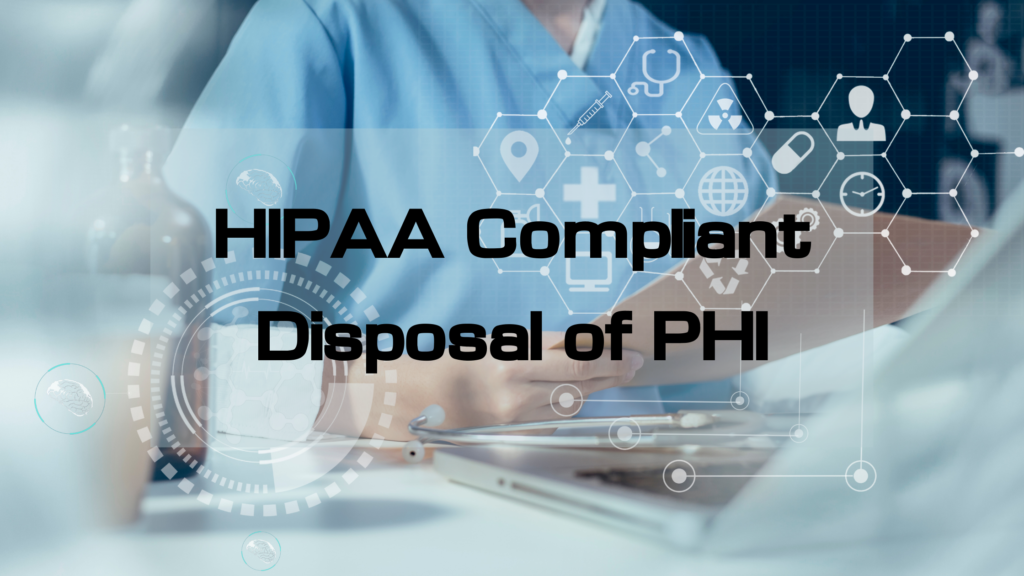In this day and age, it’s vital to keep your client’s personal information and data secure. Healthcare providers and adjacent companies are under strict regulations from medical channels to keep information safe. Additionally, patients are more worried than ever about their health data falling into the wrong hands. It’s important to find a company that follows HIPAA-compliant data destruction methods, like Securis.
When it comes to data destruction in healthcare, each company has a lot of policies they must be in compliance with. This includes the Health Insurance Portability and Accountability Act (HIPAA), Health Information Technology for Economic and Clinical Health Act (HITECH), Sarbanes-Oxley Act, Gramm-Leach-Bliley Act, FACTA Disposal Rule, PCI Data Security Standard, and the Identity Theft and Assumption Deterrence Act.
According to the U.S. Department of Health & Human Services, there were 563 suspected data breaches in the healthcare industry in 2021. Healthcare companies need to find data destruction services to prevent data breaches that may occur with end-of-life equipment. Even though a phone or computer may no longer turn on, it can still hold valuable information.
Healthcare companies collect electronic protected health information (PHI), which is critical to care for patients. However, in terms of end-of-life equipment, it can pose some challenges. It is essential to dispose of electronics properly when you work in healthcare to protect patients’ personal information.

Degaussing is the HIPAA-compliant data destruction method. After removing a hard drive from its source, it goes through the degausser. This machine changes the magnetic strip, rendering any stored information unreadable.
Shredding hard drives and solid state drives can provide more security to your data. By completely pulverizing any hard drives and cell phones, shredding provides total physical and virtual destruction.
The last thing you need is a data breach or a HIPAA violation that will hurt your business and customers.
What is PHI, and Where is it Stored?
Healthcare data contains one of the most sensitive types of information, which is why it’s important to protect it. PHI is Personal Healthcare Information which includes personal demographic information like social security numbers and private medical information. It is data that is meant to be kept between provider and patient.
This information can be found on devices such as pacemakers, x-ray machines, servers, CT machines, computers, defibrillators, and MRI machines.
The use of digital charts by medical facilities has eased communication but has increased the risk of data breaches. Companies should have similar safeguards in place for protecting end-of-life technology as they do for on-site technology.

Conforming with Federal Regulations
HIPAA
The Health Insurance Portability and Accountability Act (HIPAA) was created to protect sensitive patient health information. When you need to dispose of end-of-life equipment, find a company that follows their data destruction regulations.
HITECH
The Health Information Technology for Economic and Clinical Health Act (HITECH) was enacted to improve quality, safety, and efficiency in healthcare. HITECH includes ensuring the privacy and security of patients. As you dispose of old technology, you need to ensure that you completely destroy any and all sensitive data. This increased penalties when there are HIPAA violations, and added incentives for organizations that better comply with HIPAA.
SARBANES-OXLEY
The Sarbanes-Oxley Act created the need for companies to know the flow of their transactions, including IT asset disposition. Finding a company that offers on-site destruction and/or certificates of destruction can help you ensure that you remain compliant.
GRAMM-LEACH-BLILEY ACT
The Gramm-Leach-Bliley Act collects data and personal information. This act requires financial institutions to disclose any information-sharing practices they have with their customers. Additionally, it ensures that your company is taking the proper steps to safeguard data.
FACTA DISPOSAL RULE
The FACTA Disposal Rule requires businesses to take appropriate steps to destroy sensitive data collected from consumer reports. While the method of destruction is flexible with FACTA, you should ensure that all data and information is completely destroyed.
PCI DATA SECURITY STANDARD
The PCI Data Security Standard was created to ensure the safety of collected credit card information. Computers, iPads, and other electronic devices collect and save credit card information. Regardless of how this information is collected, your technology can save this data even if it breaks. Be sure to utilize a service that can guarantee that end-of-life equipment is clean of all stored information.
IDENTITY THEFT AND ASSUMPTION DETERRENCE ACT
The Identity Theft and Assumption Deterrence Act requires any commercial, charitable, educational, or nonprofit organization to protect collected personal information. Part of this requirement is physical safeguards. A service that collects e-waste, inventories it, and then destroys is vital for compliance.

How Securis Can Help Healthcare Meet HIPAA Requirements
Securis is equipped to handle large and small projects, from recycling data centers to collecting and microshredding cell phones. We are a one-stop shop for data destruction services. All types of healthcare organizations collect sensitive data. From insurance companies to hospitals, we will help you properly handle and destroy your digital information.
At Securis, we can ensure that all of your PHI is totally destroyed on your retired IT equipment. On top of keeping your data secure and your patients safe, we can reduce your environmental impact. We recycle and repurpose all materials so you can feel good about using our services. Our Zero-Landfill policy ensures that nothing will go to the landfill.
